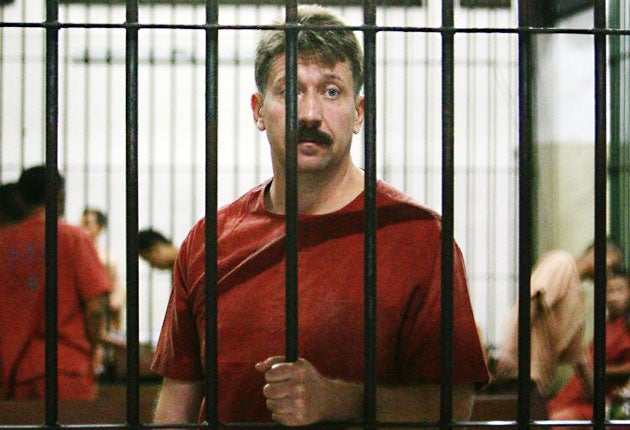'Merchant of Death' who armed tyrants fights extradition to US

A Russian arms dealer known as the "Merchant of Death" for selling weapons to renegade regimes and rebel fighters around the world appeared in a Thai court yesterday to fight his planned extradition to America.
Viktor Bout, a former Soviet air force officer, is accused of supplying arms to Colombian guerrillas, the former Liberian dictator Charles Taylor and the Libyan leader Muammar Gaddafi.
The 41-year-old Russian, who was the inspiration for Yuri Orlov – the arms dealer portrayed by Nicolas Cage in the 2005 movie Lord Of War – was arrested at a luxury Thai hotel in March as part of an elaborate sting operation to lure him out of Russia.
Undercover US agents posed as rebels from the Revolutionary Armed Forces of Colombia (Farc), saying they wanted to spend millions of dollars on weapons, including 100 surface-to-air missiles and armour-piercing rockets. But when Mr Bout arrived in Bangkok to meet his "customers", two dozen agents from the US Drug Enforcement Agency, backed by Thai police, poured into the hotel and arrested him.
Yesterday, dressed in an orange prison uniform with shackles around his ankles, he told the court he was set up by the Americans. "I never met anyone from Farc. I have never talked to anyone from Farc," Mr Bout said, as he towered above a Thai guard. "I didn't do anything wrong in Thailand."
The established facts of Mr Bout's life are sketchy. He was born in 1967 in Dushanbe, capital of the former Soviet republic of Tajikistan. It is believed he was a young military intelligence officer when the Soviet Union imploded. Among the debris left behind by the collapse of communism were thousands of Russian military aircraft, missiles, guns, grenades and ammunition, stored in arsenals watched over by underpaid guards. Mr Bout was certainly not the only Russian to suspect there was a market for this hardware in the world's trouble spots, but he proved to be one of the smartest and most efficient of the new arms dealers.
Having found a way to make the abandoned aircraft airworthy, he ran his own fleet of Antonov cargo planes to deliver directly to customers. When the Belgian government issued an arrest warrant for him on charges of gun-running and money-laundering, he closed his base at Ostend airport and moved his fleet to Sharjah in the United Arab Emirates.
One of Mr Bout's first clients was the Liberian ruler, Charles Taylor, and the weapons he sold ended up in the arms of child soldiers in Sierra Leone's brutal civil war. The United Nations suspects that Mr Bout's other African customers included Colonel Gaddafi of Libya and Mobutu Sese Seko, the former dictator of Zaire (now known as the Democratic Republic of Congo) and both sides in the Angolan civil war. He has also reputedly done business in Iran and with militants in Lebanon.
In the 1990s, Mr Bout supplied the Afghan government with weaponry to suppress the Taliban. When one of his aircraft was captured by the Taliban, he opened negotiations to get it back and went on to supply planes to the new Taliban government. Following the 11 September attacks on the US, he began transporting weapons for the Americans in Iraq and Afghanistan, despite an order signed by George Bush making it illegal to do business with him – a fact which might be expected to be key to Mr Bout's defence if he ever appears in a US court. He showed a similar even-handedness towards the UN. In 2000, after the UN accused him of breaching sanctions in Africa, he supplied the aircraft that flew UN peacekeepers to East Timor.
Robert Zachariasiewicz, a US federal agent, has already given the Thai court details of the sting operation that lured Mr Bout to Bangkok. Officials in Washington want to put him on trial charged with conspiring to kill Americans, plotting to kill US officers or employees, conspiring to provide material support to terrorists, and conspiring to acquire and use an anti-aircraft missile.
His best hope is that the Thais will instead deport him to Russia, where it is assumed he enjoys an effective immunity because of his links to the security services. Two officials from the Russian embassy were in court to watch the proceedings yesterday. The lower house of Russia's parliament, the Duma, has issued a call for Mr Bout's release, and the case continues today.
Join our commenting forum
Join thought-provoking conversations, follow other Independent readers and see their replies
Comments
Bookmark popover
Removed from bookmarks